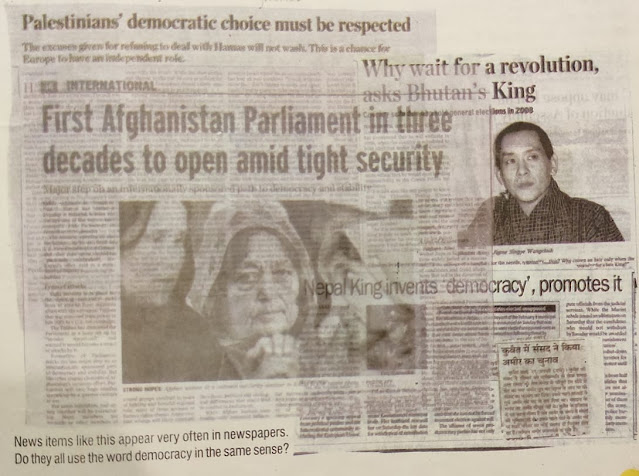7.Chapter19.Civics.Our State Governments
Class 7 Subject -
S.St.
Chapter - 19 Our State
Government
Questions / Answers
A.Tick the correct
option
1.The Governor of a
state is appointed by the Ans.(c)
President of India
2. Vidhan Parishad
is the permanent house because Ans.(c)
it cannot be dissolved
3. The Maximum
strength of the State Legislative Assembly can be Ans.(c) 500
4. The Union
Territories are directly administered by the Ans. (d) Union Government
5. Which one of
the following is NOT a Union Territory ? Ans.(b) Goa
B.Fill in the blanks :
1.In case of constitutional breakdown in a
state, the President's rule is imposed.
2.Only 6 states in India have a Vidhan Parishad.
2.Only 6 states in India have a Vidhan Parishad.
3.The Upper House in a state is called
Legislative Council.
4.The Government of a state level is called
State Government.
5.There are 28 States and 8 Union
Territories in India .
6.The members of Vidhan Sabha are elected by
the people directly
C. Write True or False for the following statements
1.The State Government can make laws only on
the Concurrent list. False
2.The Governor appoints the leader of the
majority party as the Chief Minister. True
3.Delhi has an elected Legislative
Assembly.True
4.The Vidhan Sabha is a Permanent House. False
5.The term of each member of the Legislative
Council is six years.True
D.Answer the following questions in brief :
Q
1.What is the minimum age to be the Governor of a state ?
Ans.The minimum age to be the Governor of a state is 35 years.
Q
2.What is the minimum age to be the Chief Minister of a state ?
Ans.The minimum age to be the Chief Minister of a state is 25 years.
Q
3.Who presides over the meetings of the Legislative Assembly ?
Ans.The speaker presides over the meetings of the Legislative Assembly.
Q
4.Who acts as a link between the Governor and the Council of Ministers ?
Ans.The Chief Minister acts as a link between the Governor and the Council of Ministers.
Q
5.Who appoints the Chief Minister of a state ?
Ans.
The Governor appoints the Chief Minister of a state.
E.Answer the following questions :
Q
1.Mention three functions of the State Legislature.
Ans.
The three functions of the State Legislature are following --
I. State Legislature
laws for the state on the subjects mentioned in State list
and
Concurrent
list.
II.
It keeps a check on the Council of Ministers of the state.
III.
It passes the annual budget of the state.
Q
2. Describe the powers of the Governor of a state.
Ans.
The Power of the Governor of a State are following.
I.The Governor appoints the leader of the majority party or the coalition as the
Chief Minister.
II.All appointments of high offices in the state had been made by the Governor.
III.The Governor can reduce or pardon the punishment awarded to the criminal
under the
state rules.
IV.
Governor also has some discretionary powers, which he /she can exercise on his/
her own
without the advice of the Chief Minister and Council of Ministers.
V.
The Governor can issue an Ordinance when the state legislature is not in
session.
Q
3. When is the President's rule imposed in a state ?
Ans.
In case, the State Government is not functioning according to the constitution,
it can be dissolved
earlier also. In such situations, the president's rule is imposed in the
state.
Q
4. Enlist five functions of the Council of Ministers of a state.
Ans.
Five functions of Council of Ministers of a state are following.
I. Administers and maintenance law and order in a state.
II.Executes laws and decisions made by the Legislative Assembly as well as the
Union Government.
III.Formulates policies for the state activities.
IV.Gives advice to the Governor.
V.Makes laws with the help of the State Legislature based on State List and
the Concurrent
List.
Q
5.Why should the State Governments be given more powers ?
Ans.
India is a federal country. It has two types of governments.
1.State Government. 2. Central Government.
The
State Government works under the state list (66 Sub.) and the Concurrent list (47
sub.)
The
state government should be given more powers because of the following ways
-
1.To satisfy the
regional demands.
2.It is justified
because our country has various diversities in different states.
3.There are
different regional issues and demands in social, economic, political
and cultural
fields, when only the State Government can make special provisions
and develop the neglected regions.

Thank u sir
ReplyDelete